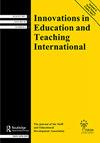The moderating role of aesthetics and information quality for acceptance of augmented reality
IF 4.9
4区 教育学
Q2 EDUCATION & EDUCATIONAL RESEARCH
Innovations in Education and Teaching International
Pub Date : 2023-10-05
DOI:10.1080/14703297.2023.2267509
引用次数: 0
Abstract
ABSTRACTThis study explores the moderating role of aesthetics and information quality on the technological acceptance of augmented reality. A technology acceptance model with the following variables was used: perceived ease of use, perceived usefulness, attitude towards using, and behavioural intention to use. Analysis was conducted by using structural equation modelling and a participation of 90 engineering students. Participants used an augmented-reality app for electrical resistive circuits, which works as a virtual laboratory. The app allows manipulating circuit elements and computing voltage and amperage values using the loop method, applying Kirchhoff’s voltage law. The results suggest that aesthetics and information quality influence attitudes towards use. These findings show the importance of aesthetics and information quality in accepting augmented reality apps; therefore, designers and developers should consider these factors. This type of study has not been investigated previously.KEYWORDS: Augmented realityengineering educationmobile learningtechnology acceptancevirtual labs Disclosure statementNo potential conflict of interest was reported by the author(s).Additional informationFundingThe work was supported by the Government of the Region of Madrid [S2018/TCS-4307]; Research Department, University of La Serena, Chile [PR2111014].Notes on contributorsAlejandro Álvarez-MarínAlejandro Álvarez-Marín received the title of Industrial Engineer from the Universidad de La Serena, Chile, the master’s degree in Information Technology from the Universidad Técnica Federico Santa María, Chile, and the PhD in Information and Communication Technologies at the Universidad Rey Juan Carlos, Spain, in 2003, 2008, and 2023, respectively. He is currently an associate professor at the Universidad de La Serena, Chile. His research areas are information technology, innovation, and education, and he is a member of the IEEE Computer and Education Societies.J. Ángel Velázquez-IturbideJ. Ángel Velázquez-Iturbide received the degree and PhD degrees in computer science from the Universidad Politécnica de Madrid, Spain, in 1985 and 1990, respectively. He is currently with the Universidad Rey Juan Carlos as a Professor, where he is the Leader of the Laboratory of Information Technologies in Education (LITE). His research areas include methodologies and tools for programming and algorithms education. He is a Senior Member of the IEEE Computer and Education Societies, and a Senior Member of the ACM. He is the Vice-Chairman of the Spanish Association for the Advancement of Computers in Education (ADIE) and a member of Boards of the Spanish Informatics Scientific Society (SCIE) and the Informatics for All Coalition.Mauricio Castillo-VergaraMauricio Castillo-Vergara is a Doctor in economic and business sciences, Bachelor of Science in Engineering, Industrial Civil Engineer and Master in Business Management. He is currently working as an academic researcher at the Faculty of Economics and Business at the Alberto Hurtado University. His leading research and chairs are Entrepreneurship, Innovation, and Creativity. He is the author of several articles on SMEs, entrepreneurship, creativity, and innovation. He has published in national and international journals such as Innovation: Organization & Management, Journal of Business Research, Thinking Skills and Creativity, Journal of Cleaner Production, Journal of Technology & Innovation Management. He has taught and participated in various national and international presentations, seminars and courses.Christian Acuña-OpazoChristian Acuña-Opazo received the title of Industrial Engineer from the Universidad de La Serena, Chile, in 2000; the master’s degree in Business Administration from the Universidad Católica del Norte, Coquimbo, Chile, in 2007; and is currently a Ph.D. student in “Economics and Management of Organizations,” University of Zaragoza, Spain. He is currently an assistant professor at the Universidad de La Serena and Universidad Central de Chile. His research areas are Family Business, Value Creation, and Corporate Finance.美学和信息质量对增强现实接受度的调节作用
摘要本研究探讨了美学和信息质量对增强现实技术接受度的调节作用。使用了包含以下变量的技术接受模型:感知易用性、感知有用性、对使用的态度和使用的行为意图。利用结构方程模型和90名工程专业学生的参与进行了分析。参与者使用了一个用于电阻电路的增强现实应用程序,它就像一个虚拟实验室。该应用程序允许操作电路元件和计算电压和安培值使用循环方法,应用基尔霍夫电压定律。结果表明,美学和信息质量影响使用态度。这些发现表明美学和信息质量在接受增强现实应用程序方面的重要性;因此,设计师和开发人员应该考虑这些因素。这种类型的研究以前没有被调查过。关键词:增强现实工程教育移动学习技术接受虚拟实验室披露声明作者未报告潜在利益冲突。这项工作得到了马德里地区政府的支持[S2018/TCS-4307];智利拉塞雷纳大学研究中心[PR2111014]。salejandro Álvarez-MarínAlejandro Álvarez-Marín分别于2003年、2008年和2023年获得智利拉塞雷纳大学工业工程师称号、智利费德里科桑塔María大学信息技术硕士学位和西班牙雷胡安卡洛斯大学信息与通信技术博士学位。他目前是智利拉塞雷纳大学的副教授。他的研究领域是信息技术、创新和教育,他是IEEE计算机和教育协会的成员。天使Velazquez-IturbideJ。Ángel Velázquez-Iturbide分别于1985年和1990年获得西班牙马德里理工大学计算机科学学士学位和博士学位。他目前在雷伊胡安卡洛斯大学担任教授,在那里他是教育信息技术实验室(LITE)的负责人。他的研究领域包括编程和算法教育的方法和工具。他是IEEE计算机和教育协会的高级会员,也是ACM的高级会员。他是西班牙计算机教育促进协会(ADIE)的副主席,也是西班牙信息科学学会(SCIE)和全民信息联盟的董事会成员。Mauricio Castillo-Vergara是经济和商业科学博士,工程学学士,工业土木工程师和商业管理硕士。他目前在阿尔贝托·乌尔塔多大学经济与商业学院担任学术研究员。他的主要研究和主席是创业、创新和创造力。他撰写了多篇关于中小企业、创业精神、创造力和创新的文章。曾在《创新:组织与管理》、《商业研究杂志》、《思维技能与创造力》、《清洁生产杂志》、《技术与创新管理杂志》等国内外期刊发表文章。他教授并参加了各种国内和国际演讲、研讨会和课程。Christian Acuña-OpazoChristian Acuña-Opazo于2000年获得智利拉塞雷纳大学工业工程师称号;2007年获得智利科金博北部大学Católica工商管理硕士学位;目前是西班牙萨拉戈萨大学“组织经济与管理”专业的博士生。他目前是拉塞雷纳大学和智利中央大学的助理教授。他的研究领域为家族企业、价值创造和企业融资。
本文章由计算机程序翻译,如有差异,请以英文原文为准。
求助全文
约1分钟内获得全文
求助全文
来源期刊

Innovations in Education and Teaching International
EDUCATION & EDUCATIONAL RESEARCH-
CiteScore
4.80
自引率
5.60%
发文量
68
期刊介绍:
Innovations in Education and Teaching International (IETI), is the journal of the Staff and Educational Development Association (SEDA) www.seda.ac.uk. As such, contributions to the Journal should reflect SEDA"s aim to promote innovation and good practice in higher education through staff and educational development and subject-related practices. Contributions are welcomed on any aspect of promoting and supporting educational change in higher and other post-school education, with an emphasis on research, experience, scholarship and evaluation, rather than mere description of practice.
 求助内容:
求助内容: 应助结果提醒方式:
应助结果提醒方式:


